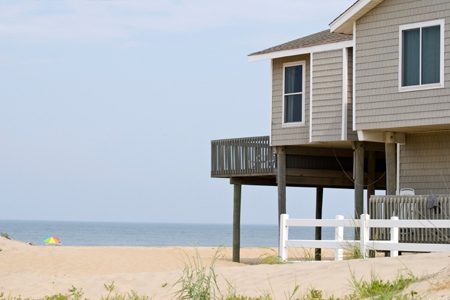(TNS)—Summer is inching closer, but, if the data are accurate, fewer Americans have bought vacation houses lately.
The National Association of REALTORS® reported lower vacation-home sales in 2015, although the numbers were the second-highest in about 10 years.
There were about 920,000 vacation-home sales nationally, the REALTORS® group said, compared with 1.13 million in 2014.
Sales estimates are based on a national online survey including responses from more than 2,000 adults in the United States who purchased residential properties last year. Excluded was institutional investment activity.
The median vacation-home price was $192,000 — half the homes sold for more, half for less. That was up 28 percent from $150,000 in 2014, the REALTORS® group reported.
Vacation-home sales accounted for 16 percent of all transactions in 2015 – down from 2014 (21 percent), but still the second-highest share since the survey was first conducted in 2003, the report said.
The share of vacation buyers paying cash jumped to 38 percent, from 30 percent in 2014.
Vacation-home buyers in 2015 had a higher median household income ($103,700) than those in 2014 ($94,380) and purchased properties that were a median distance of 200 miles away from their primary residences (unchanged from a year ago).
Buyers plan to own their properties for a median of seven years, an increase from six years in 2014.
With more vacation buyers purchasing single-family homes (58 percent) compared with a year ago (54 percent), the share of those buying condos (25 percent) or townhouses or rowhouses (13 percent) decreased.
Forty percent of vacation buyers purchased in beach areas, 19 percent purchased in the mountains or at lakefronts, and 16 percent purchased in the country.
Nearly half of all vacation homes bought last year were in the South (47 percent, 41 percent in 2014); 25 percent were in the West (unchanged from a year ago); 15 percent in the Northeast (unchanged from a year ago); and 13 percent in the Midwest (14 percent in 2014).
More than one-third of buyers planned to use their properties for vacations or as family retreats (37 percent), 16 percent bought for future retirement plans, and only 7 percent purchased to generate income through renting the properties, a decrease from 11 percent in 2014.
Who’s renting now? The Urban Institute’s Housing Finance Policy Center has found that there are now 19 million renters who were at one point homeowners in the last 16 years.
In addition, 96 million renters have not had mortgages in the last 16 years, the institute said.
Ah, millennials. First-time home buyers have become a more financially select group since the housing boom ended, according to research published recently by BuildZoom’s chief economist, Issi Romem.
The post-housing boom wave of first-timers is buying larger homes than those during the boom, he said.
From Bank of America comes a finding that 66 percent of first-time millennial home buyers expect some kind of assistance from their parents, ranging from financial support to help moving in.
“Aspirational and emotional factors” motivate more than three-quarters of first-time buyers.
The same number of buyers consider saving for/paying off a home (92 percent) as important as saving for retirement (91 percent).
If you are 30 years old, why save for retirement? If you don’t, you will be sooorrrry.
©2016 The Philadelphia Inquirer
Distributed by Tribune Content Agency, LLC.











